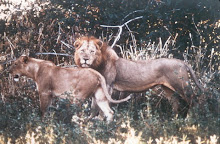A trip to Luangwa Valley, Zambia proved life changing for Wild Notebook columnist Simon Barnes
I got up before dawn to say farewell. One of the great times of my life was ending. I had been here for two months, on an all-but-ruinous self-imposed sabbatical. I had stayed at the same camp on the Luangwa River in Zambia, slept in the same hut, driven the same drives and walked the same walks. Now it was over.
Outside my hut – a sort of largish laundry basket containing a bed and a table – lay the deep, hollow bed of the river. After an endless expanse of beach, you could at last make out the knee-deep trickle of the river itself: at its last gasp, waiting for rains. The camp had to be dismantled that day, before the rains came, and I had to say farewell to the people I had shared the place with and start making my way back to real life. Or back from real life: you decide.
I had seen wonders. I had been on terms of the closest possible intimacy with a pride of lions. I had been charged by an elephant while on foot – not very seriously charged, she turned away at a nonchalant handclap from my cool-in-the-bush companions.
I had seen crocs in teams of a hundred and more, I had seen the air turn into flame at the carmine bee-eater colony. I had walked with impala and puku, gazed at kudu and eland; I had followed leopard on their wild night-hunts and watched them kill. In short, I had lost my heart: or a piece of it, anyway.
I have my notes for that last day. For some perverse reason I only recorded the creatures I identified by ear. Hard to remember why: but I suspect it was an expression of my intimacy with the place. I no longer had to look in order to know. All my senses were now bush-senses. I was not an outsider looking in: I belonged. My ears told me that.
Six species of mammal, then: the distant crump of lion, the explosive scolding of a baboon spat, the dirty-old-man laughter of hippo from a still-deep pool of the river, the bark of impala, the last noise you’d expect from so frail a beast, and behind camp, the log-sawing roar of leopard.
I also noted 30 bird-voices; not so many, perhaps, but then I was only at it for an hour or so. On one day, a reasonably leisurely one, I had recorded 134 species in a single day, a record that has since been beaten many times. At that time, I could put a name to every cough and trill and tinkle. It was a matter not just of listening but also of belonging.
What I like best about the Luangwa Valley is absolutely everything. The totality of the environment is the thing. I love above all the way the place sucks you in, the way you cannot help but become a part of it. And everything you do is spiced with just a little whiff of danger, to make you feel more alive than is possible anywhere else, because, of course, the place is full of things that can kill you.
So I noted the orange-breasted bush shrike, which sings Beethoven’s; Fifth, and the distant booming of ground hornbill, and the sweet whistle of black-naped oriole, and the rest; lion roaring in the distance. There was, inevitably, a clamorous farewell from the African fish eagle: the very sound of the valley. And then I left.
Ah, but that’s the most terrible lie. I’ve never left. I’ve been back, a dozen or so times, but in a way, that hardly matters. The fact is that the place has become part of me. When I go back, I see new wonders, and I become reacquainted with the same old wonders seen a hundred times before. But I don’t really mind if I see nothing at all. I demand nothing of the place. I just need to breathe the valley air: to know that there are wonders out there still. Whether or not I see them myself hardly matters any more. It’s just good to get back in touch with that missing piece of my heart.
http://www.timesonline.co.uk/tol/life_and_style/related_features/love_nature/article3537153.ece


No comments:
Post a Comment